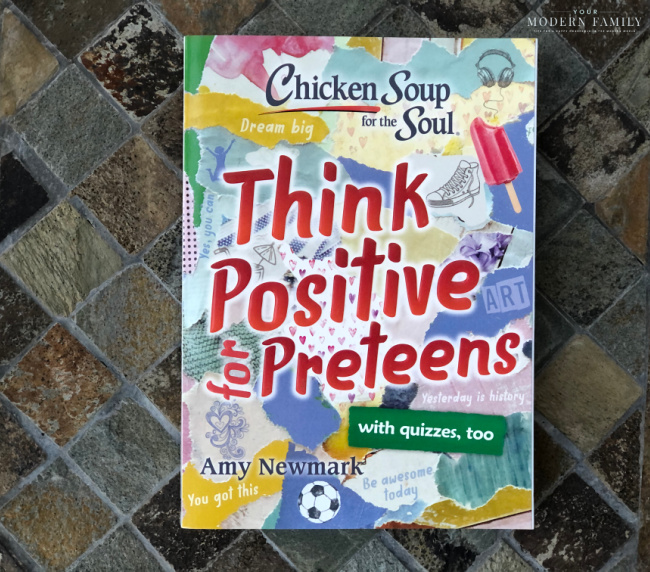This post may contain affiliate links. Please read our disclosure policy.
Growing up can be tough for preteens, but they can benefit from having a growth mindset, as well as learning how other 9–12-year-olds handled the challenges of adolescence. Learning the power of positive thinking to overcome negative emotions is important for their mental health, but how do they learn this? A lot of it is learned by seeing the examples of others.

Positive emotional health starts with positive thoughts and a positive attitude. The more inspirational stories that you read, the more you are training your mind to have a positive outlook in all areas of your life. The physical and mental benefits of positive thinking have been proven to have a major impact on the lives of everyone… preteens included!
By reading and hearing stories of positive people, our preteens can harness the power to get rid of negative self-talk and negative thought, while replacing it with positive self-talk and positive affirmations of self. They can stand strong, be grateful for every day, and feel good about themselves.
For the last 25 years, kids have been finding role models, comfort, and useful advice in the pages of Chicken Soup for the Soul books, including Chicken Soup for the Teenage Soul.
Today, I’m excited to share the newly released Chicken Soup for the Soul: Think Positive for Preteens from our partner! This book provides tips for today’s preteens on issues such as making true friends, doing the right thing, facing challenges, and being grateful.

This new collection of true stories in this book will inspire you to “think positive” and be the happiest, best version of yourself. These true stories are organized into chapters that will inspire you to:
- Just Be You – because being yourself is always the right decision
- Make True Friends – the ones who truly make you happy
- Do the Right Thing – we know you’ll feel good if you do
- Go Ahead and Try It – this is the time to explore new sports and activities
- Face Your Challenges – you’ll see you’re not alone when you do
- Count Your Blessings – gratitude really is the key to happiness
- Treasure Your Family – even if they drive you crazy, they’re the best
- Look Past the Obvious – you’ll gain a new perspective on friends and family
Today I wanted to share a few excerpts from the book.
Positive Thinking Tips for Preteens
The following tips are followed by summaries of five stories, taken from the book, Chicken Soup for the Soul: Think Positive for Preteens. These tips for positive thinking for preteens are so useful as they navigate through the ups and downs of figuring out who they are and who they want to become.
1. In order to be truly popular, you have to make true friends.
Victoria Fedden used to watch the “popular girls” across the middle school cafeteria and wish she could get a seat at their table. But then she walked by them one day and they made fun of her.
Victoria sat down with her own friends and had an epiphany: “Why would I even want to be friends with people who were so mean?” She looked around and spotted a boy sitting by himself and impulsively asked him to come and sit with her and her friends.
Victoria says, “From then on, we made a point to invite everyone the popular girls made fun of to eat at our lunch table.”
Eventually, Victoria’s table was even a refuge for girls who’d been kicked out of the popular group.
She says, “When I looked at my group of friends, which seemed to grow every day, I understood where the true ‘popular table’ was in our middle school cafeteria and knew that I had gotten my wish after all.”
2. You are not defined by what you wear.
Denise Reich felt like she had two identities in fifth grade; outside of school she was a happy kid who spent time with friends and her hobbies, but in class, she was always on guard and expecting to be teased.
Why?
Because Denise’s single mother couldn’t afford to buy her the designer clothing the other girls wore.
It was only at summer camp that Denise found a new group of kids who didn’t care what kind of clothes anyone wore. Unfortunately, the teasing resumed when she went back to school.
Denise begged her mother for a designer item, and she received one for Christmas. When she wore it to school and was complemented by one of her shallow classmates, Denise found no pleasure in it.
She had finally learned her lesson, saying, “The one person I had to learn to impress was myself, and I’d done it.”
3. Don’t be embarrassed to do what feels right.
Beth Cato was excited when she started junior high school, but she was quickly disillusioned. She had P.E. for the first period and thus was in the girls’ locker room when the principal recited the Pledge of Allegiance over the school’s PA system.
Beth was shocked when the other girls started ignoring the Pledge each morning; even the gym teachers talked through it. By the second week of school, Beth was the only girl in the locker room who stood respectfully and recited the Pledge. And this was in a Navy town!
Finally, a girl confronted Beth and asked why she was still doing the Pledge. When Beth responded that her grandfather, recently deceased, was a proud veteran, the girl was embarrassed.
Beth says, “I never inspired other girls to do the pledge along with me. That was okay. They made a choice; I made mine.”

4. Learn to count your blessings.
Suzanne De Vita envied her friend Michelle, who lived in a large, tidy, quiet house. She admired her huge bedroom, her toys, and her nanny and housekeeper. She failed to notice that Michelle’s parents were rarely home, or that Michelle was lonely when Suzanne wasn’t there.
It was only when Michelle came to visit Suzanne’s messy, chaotic house, overflowing with her five siblings and her parents, that Suzanne noticed how much fun her own home was.
Michelle was soaking it in, laughing with the family during dinner, and enjoying every moment.
She told Suzanne, “You’re so lucky you have such a big family.” Suzanne concludes her story by saying, “Suddenly, my house—my crowded, messy, loud house—seemed like paradise.”
5. A smile can work wonders.
Jennifer Youngblood’s fear of a bully named Rosalie was ruining seventh grade for her. When Jennifer’s mother suggested she try to be more like her father and smile at everyone in her path, she decided to try an experiment. She would smile at the meanest girl she knew.
It worked. Rosalie was startled, but she didn’t retaliate in any way. And over the next few weeks of Jennifer smiling at her, Rosalie softened and eventually smiled back.
Jennifer moved on to say hello, and Rosalie said hi back. Jennifer said that was the beginning of her getting over her shyness.
She says, “In the years that followed, I broke out of my shell one small chip at a time. I made many new friends and became an active participant in my classes. Looking back now, I can trace it all to that fateful day when I had the courage to smile in the face of the bully.”














